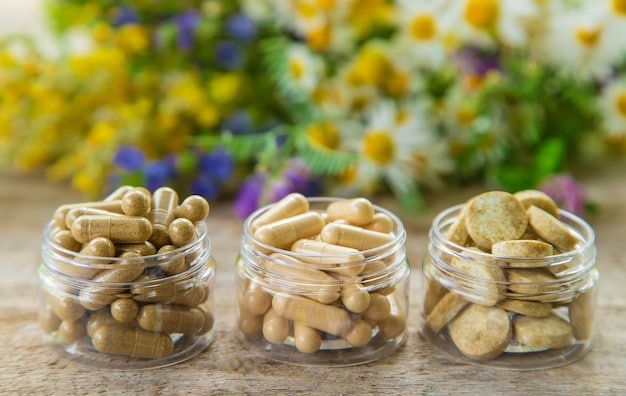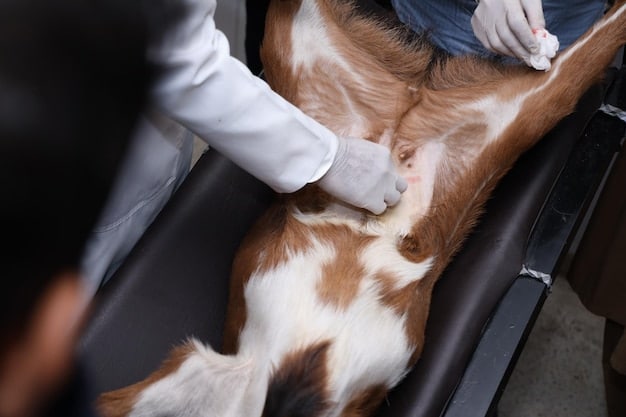New Research: Probiotics Link to Gut Health and Pet Behavior

Anúncios
New research indicates a significant link between gut health and pet behavior, suggesting that probiotics may play a vital role in improving both digestive wellness and behavioral patterns in animals.
Recent findings highlight the intricate connection between gut health and behavior in pets, suggesting that new research: the link between gut health and pet behavior – probiotics may help in managing various health and behavioral issues.
Anúncios
Understanding the Gut-Behavior Connection in Pets
The relationship between a pet’s gut health and its behavior is an area of growing interest in veterinary medicine. The gut microbiome, comprising trillions of bacteria, fungi, and other microorganisms, plays a pivotal role not only in digestion but also in influencing brain function and behavior. Understanding this connection is crucial for pet owners who seek to improve their animal companions’ overall well-being.
Recent research has shed light on how imbalances in the gut microbiome can manifest as behavioral issues, such as anxiety, aggression, and hyperactivity. These findings suggest that addressing gut health can be a key component in managing and mitigating these behavioral problems. Probiotics, which are beneficial live bacteria, have emerged as a potential solution to promote a balanced gut microbiome and, consequently, improve pet behavior.
Anúncios
The Gut-Brain Axis: A Two-Way Street
The bidirectional communication pathway between the gut and the brain, known as the gut-brain axis, allows for constant interaction and influence. This pathway involves neural, hormonal, and immunological signals, enabling the gut microbiome to affect mood, behavior, and cognitive function in pets. Disruptions in the gut microbiome can lead to dysregulation of these signals, potentially triggering behavioral changes.
Impact of Diet on Gut Health and Behavior
A pet’s diet significantly influences the composition and diversity of the gut microbiome. Diets high in processed foods and low in fiber can negatively impact gut health, leading to an overgrowth of harmful bacteria and a reduction in beneficial species. This imbalance can disrupt the gut-brain axis, contributing to behavioral issues. Conversely, a balanced diet rich in fiber and nutrients supports a healthy gut microbiome and promotes positive behavior.

- A balanced gut microbiome supports the production of neurotransmitters like serotonin, which regulates mood and behavior.
- Dysbiosis, or an imbalance in the gut microbiome, can lead to increased stress and anxiety in pets.
- Probiotics can help restore a healthy gut microbiome, leading to improved behavior and overall well-being.
In conclusion, the gut-behavior connection in pets is a complex and dynamic relationship. Recognizing the influence of the gut microbiome on brain function and behavior can empower pet owners and veterinarians to adopt holistic approaches that prioritize gut health for improved pet well-being.
How Probiotics Can Positively Influence Pet Behavior
Probiotics are increasingly recognized for their potential to positively influence pet behavior by improving gut health. These beneficial bacteria can help rebalance the gut microbiome, reduce inflammation, and enhance the production of neurotransmitters that regulate mood and behavior. Understanding how probiotics work can provide pet owners with a valuable tool in managing behavioral issues.
By promoting a healthy gut microbiome, probiotics can mitigate the negative effects of dysbiosis, such as anxiety, aggression, and hyperactivity. The ability of probiotics to modulate the gut-brain axis offers a promising avenue for addressing behavioral problems in pets. Incorporating probiotics into a pet’s diet can lead to noticeable improvements in their overall well-being.
Mechanisms of Action: How Probiotics Work
Probiotics work through multiple mechanisms to influence pet behavior. They compete with harmful bacteria for resources and attachment sites in the gut, helping to restore a balanced microbiome. Additionally, probiotics can enhance the integrity of the gut lining, reducing inflammation and preventing the translocation of harmful substances into the bloodstream. By modulating the gut-brain axis, probiotics can influence neurotransmitter production and signaling, leading to improved mood and behavior.
Choosing the Right Probiotic Supplement
Selecting the right probiotic supplement for your pet is crucial for achieving desired behavioral benefits. Look for supplements that contain a variety of bacterial strains known to support gut health and influence the gut-brain axis, such as Lactobacillus and Bifidobacterium. Consider the specific needs of your pet, including their age, breed, and existing health conditions, when choosing a probiotic supplement. Consulting with a veterinarian can provide valuable guidance in selecting the most appropriate probiotic for your pet.

- Probiotics can improve the production of serotonin, a neurotransmitter that promotes feelings of well-being and reduces anxiety.
- Supplementing with probiotics can reduce inflammation in the gut, which can alleviate behavioral issues linked to discomfort.
- Consistent probiotic use can lead to long-term improvements in pet behavior, promoting a happier and healthier life.
In summary, probiotics can positively influence pet behavior by promoting a healthy gut microbiome, reducing inflammation, and modulating the gut-brain axis. Choosing the right probiotic supplement and incorporating it into your pet’s diet can result in significant improvements in their overall well-being and behavior.
Research Supporting the Use of Probiotics for Pet Behavior
Extensive research supports the use of probiotics for improving pet behavior by focusing on the gut-brain axis. Studies have indicated that specific strains of probiotics can effectively reduce anxiety, aggression, and hyperactivity in pets. By bolstering the balance of the gut microbiome, probiotics assist in regulating neurotransmitter production and reducing inflammation, ultimately leading to improved behavioral outcomes.
The accumulating evidence underscores the potential of probiotics as a valuable tool for pet owners and veterinarians in managing behavioral issues. Examining the key findings from these studies can provide insights into the specific benefits and applications of probiotics for enhancing pet well-being. Incorporating probiotics into a comprehensive approach to pet care can yield significant and positive results.
Key Studies on Probiotics and Anxiety
Several studies have examined the effects of probiotics on anxiety in pets. One notable study found that dogs receiving a probiotic supplement showed a significant reduction in anxiety-related behaviors, such as excessive barking and pacing. These findings suggest that probiotics can help modulate the gut-brain axis, influencing neurotransmitter production and reducing feelings of anxiety. The use of probiotics may offer a natural and effective way to manage anxiety in pets.
Probiotics for Aggression and Hyperactivity
Research has also investigated the potential of probiotics to mitigate aggression and hyperactivity in pets. One study found that cats supplemented with probiotics exhibited reduced aggressive behaviors, such as hissing and biting. Similarly, another study reported that dogs with hyperactivity showed improvements in attention and focus after receiving a probiotic supplement. These results indicate that probiotics can play a role in stabilizing behavior and promoting a calmer disposition in pets.
- Probiotics can reduce the production of stress hormones, such as cortisol, which can contribute to anxiety and aggression.
- Specific probiotic strains have been shown to enhance cognitive function, improving attention and focus in hyperactive pets.
- Combining probiotics with behavioral training can lead to synergistic effects, promoting more effective and lasting improvements in pet behavior.
In conclusion, research supporting the use of probiotics for pet behavior continues to grow, highlighting the potential of these beneficial bacteria to address anxiety, aggression, and hyperactivity. By modulating the gut-brain axis and promoting a healthy gut microbiome, probiotics offer a promising avenue for enhancing pet well-being and improving behavioral outcomes.
Practical Tips for Incorporating Probiotics into Your Pet’s Routine
Incorporating probiotics into your pet’s routine can be a simple yet effective way to support their gut health and improve behavior. However, ensuring that you choose the right probiotic supplement and administer it correctly is essential for achieving optimal results. By following practical tips and guidelines, pet owners can maximize the benefits of probiotics and enhance their animal companions’ overall well-being.
Starting slowly and monitoring your pet’s response to probiotics can help you identify the most effective approach for their specific needs. Consistency is key when it comes to probiotics, as regular use is required to maintain a healthy gut microbiome. Adopting a holistic approach that includes a balanced diet and regular exercise can further enhance the benefits of probiotics.
Choosing the Right Form of Probiotic Supplement
Probiotic supplements come in various forms, including capsules, powders, and chews. When choosing a supplement, consider your pet’s preferences and ease of administration. Capsules can be mixed into food or given directly, while powders can be sprinkled on top of meals. Chews offer a palatable option for pets who are resistant to other forms of supplementation. Selecting a form that your pet readily accepts will make it easier to maintain a consistent routine.
Dosage and Administration Guidelines
Following the recommended dosage guidelines is crucial for achieving the desired effects of probiotics. Start with a low dose and gradually increase it over time to minimize the risk of digestive upset. Administer the probiotic supplement at a consistent time each day, preferably with a meal. Avoid giving probiotics with hot food or liquids, as heat can damage the beneficial bacteria. Monitor your pet’s response and adjust the dosage as needed under the guidance of a veterinarian.
- Introduce probiotics gradually to prevent digestive upset, starting with a small dose and increasing over several days.
- Mix probiotic powders thoroughly into your pet’s food to ensure even distribution and consumption.
- Store probiotic supplements in a cool, dry place to maintain their viability and effectiveness.
In summary, incorporating probiotics into your pet’s routine involves choosing the right form of supplement, following appropriate dosage guidelines, and maintaining consistency. By adopting these practical tips, pet owners can support their animal companions’ gut health and improve their overall behavior and well-being.
The Role of Diet and Lifestyle in Supporting Gut Health
Diet and lifestyle play a significant role in supporting gut health and, subsequently, pet behavior. A balanced diet rich in fiber and essential nutrients provides the foundation for a healthy gut microbiome. Regular exercise and stress management further contribute to maintaining a balanced digestive system. Understanding the impact of these factors can empower pet owners to make informed choices that enhance their pets’ well-being.
Avoiding processed foods and minimizing exposure to environmental toxins can help reduce the risk of dysbiosis and support a thriving gut microbiome. Incorporating a variety of whole foods into your pet’s diet can provide a diverse range of prebiotics, which nourish beneficial bacteria and promote their growth. Encouraging regular physical activity and minimizing stress can further enhance gut health and improve overall behavior.
The Importance of Fiber in Pet Nutrition
Fiber is an essential component of a pet’s diet, promoting healthy digestion and supporting a balanced gut microbiome. Soluble fiber, found in foods such as oats and peas, dissolves in water and forms a gel-like substance that helps regulate bowel movements. Insoluble fiber, present in foods like carrots and celery, adds bulk to the stool and promotes regular elimination. A diet rich in fiber can prevent constipation, reduce inflammation, and support the growth of beneficial bacteria in the gut.
Minimizing Stress and Promoting Relaxation
Stress can negatively impact gut health and contribute to behavioral issues in pets. When pets experience stress, their bodies release stress hormones that can disrupt the balance of the gut microbiome and impair digestive function. Minimizing stress and promoting relaxation can help maintain a healthy gut and improve overall well-being. Provide your pet with a safe and comfortable environment, encourage regular exercise, and engage in activities that promote relaxation, such as gentle petting or playing with toys.
- Incorporate prebiotic-rich foods, such as bananas and chicory root, into your pet’s diet to nourish beneficial bacteria.
- Ensure your pet has access to fresh, clean water at all times to support healthy digestion.
- Consult with a veterinarian to determine the optimal diet and lifestyle for your pet’s specific needs.
In conclusion, diet and lifestyle play a crucial role in supporting gut health and improving pet behavior. By prioritizing a balanced diet, minimizing stress, and promoting relaxation, pet owners can enhance their animal companions’ overall well-being and foster a healthy gut microbiome.
Potential Challenges and Considerations When Using Probiotics
While probiotics offer promising benefits for pet behavior, pet owners should be aware of potential challenges and considerations. Some pets may experience mild digestive upset when first starting probiotics, while others may not respond at all. Understanding these potential issues can help you navigate using probiotics effectively and ensure the best possible outcomes for your animal companion.
Consulting with a veterinarian before starting probiotics can help you identify any underlying health conditions that may affect your pet’s response. Starting with a low dose and gradually increasing it over time can minimize the risk of digestive upset. Monitoring your pet’s response and adjusting the approach as needed can help you optimize the benefits of probiotics.
Possible Side Effects and How to Manage Them
Some pets may experience mild side effects when first starting probiotics, such as gas, bloating, or diarrhea. These symptoms are typically temporary and resolve on their own within a few days. To minimize the risk of side effects, start with a low dose and gradually increase it over time. If your pet experiences persistent or severe digestive upset, discontinue use and consult with a veterinarian. Ensuring your pet has access to fresh water and feeding them a balanced diet can help manage any side effects that may occur.
Ensuring Quality and Viability of Probiotic Supplements
The quality and viability of probiotic supplements can vary widely, affecting their effectiveness. Look for reputable brands that conduct third-party testing to ensure the purity and potency of their products. Check the expiration date and store probiotics in a cool, dry place to maintain their viability. Avoid purchasing supplements that have been exposed to heat or moisture, as these conditions can damage the beneficial bacteria. Choosing high-quality supplements and storing them properly can help ensure you are providing your pet with an effective product.
- If your pet has a sensitive digestive system, consider using a hypoallergenic probiotic supplement.
- Probiotics may interact with certain medications, so consult with a veterinarian before starting supplementation.
- Monitor your pet’s behavior and digestive health closely to assess the effectiveness of probiotics.
In summary, while probiotics offer numerous benefits for pet behavior, it’s important to be aware of potential challenges and considerations. By consulting with a veterinarian, starting with a low dose, and ensuring the quality and viability of probiotic supplements, pet owners can navigate using probiotics effectively and enhance their animal companions’ overall well-being.
| Key Point | Brief Description |
|---|---|
| 🐾 Gut-Brain Axis | Two-way communication between the gut and brain affecting mood and behavior. |
| 🌱 Probiotics Influence | Beneficial bacteria can improve gut health and positively impact behavior. |
| 🩺 Consult Vet | Always consult a vet before starting a probiotic regimen for your pet. |
| 🍎 Diet Matters | A balanced diet is crucial for gut health and overall well-being. |
Frequently Asked Questions (FAQ)
▼
The gut-brain axis is the two-way communication pathway between the gut and the brain. This connection influences various aspects of a pet’s health, including mood, behavior, and digestive function.
▼
Probiotics improve pet behavior by promoting a healthy gut microbiome. This helps in regulating neurotransmitter production and reducing inflammation, which can lead to improved mood and reduced anxiety.
▼
Common probiotic strains for pets include Lactobacillus and Bifidobacterium. These strains are known for their ability to support gut health and positively influence the gut-brain axis.
▼
Some pets may experience mild digestive upset, such as gas or bloating, when first starting probiotics. These side effects are usually temporary and can be managed by starting with a low dose.
▼
Diet is crucial for maintaining gut health. A balanced diet rich in fiber and essential nutrients supports a healthy gut microbiome, promoting better digestion and overall well-being in pets.
Conclusion
In conclusion, the compelling link between gut health and pet behavior opens new avenues for addressing behavioral issues through dietary interventions like probiotics. New research suggests that maintaining a balanced gut microbiome can lead to significant improvements in a pet’s overall well-being, making probiotics a valuable tool for pet owners.






